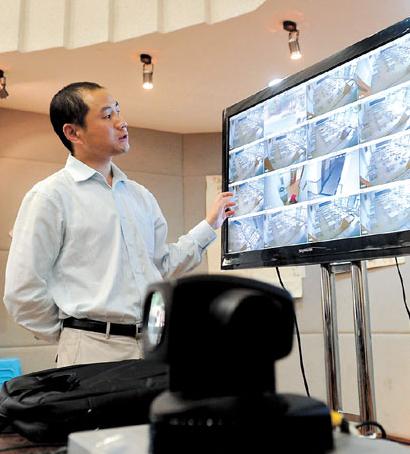Quiet please! It's examination time
 0 Comment(s)
0 Comment(s) Print
Print E-mail Shanghai Daily, June 7, 2012
E-mail Shanghai Daily, June 7, 2012
The taxis are booked, hotels near the test centers are full, police are on patrol, car horns are silent and all is quiet on construction sites - that will be Shanghai today for the start of the National College Entrance Exam, or the "battle to determine one's fate," as the two-day test is commonly known.
About 55,000 students will be heading to nearly 100 test centers in the city early this morning, while their anxious parents will wait outside. Across the country, more than 9 million students will sit in the exam, making it the largest in China and, indeed, the world.
There's tension in the air every June around exam time. Students are urged to seize the once-in-a-life time opportunity to go to a good university, find a good job and settle down to a happy life.
However, students who took the test about a decade ago tell a different story. Those who did well say the test cannot guarantee a bright future and those who failed found that "all roads lead to Rome," meaning there were other ways to achieve their goals.
Bill Wang, 31, failed the exam, or gaokao, in 1999. He and his parents felt a sense of hopelessness at the time. He suffered a mental breakdown.
"My cousin was too excellent," he said. "My family gave me lots of pressure by comparing him with me."
Wang was a naughty child. He skipped classes from time to time. When he tried to work hard to catch up with his high school classmates it was too late. He ended up in a third-class college.
His cousin Julio Hu, one year older, was just the opposite. Very diligent and the top student in his class, he was so highly regarded that he was admitted to university without even having to sit the exam.
However, the pair soon found that exam success wasn't the guarantee it was made out to be.
At university, Hu witnessed students indulging themselves in computer games, skipping classes, failing tests, and dropping out. Some were even driven to suicide.
"There are lots of tests in our life," Hu said. "The college entrance exam is just a very small one. Passing it cannot guarantee you anything."
Hu remained diligent, however, studying hard and eventually becoming a university teacher.
Wang, who had gone to what was considered a mediocre college, managed to transfer to university because he did so well there.
He studied part-time for a master's degree and recently, he passed the national civil servant test to win the so-called "iron rice bowl" job which is said to guarantee lifelong job security.
"I never gave up trying after the exam," he said. "There are lots of opportunities in our life, apart from the exam."
Today's competition for a university place seems to be less fierce than when the cousins sat the exam, with universities expanding and a falling numbers of test takers.
Students have more choice nowadays including sitting the universities' own admission exams or going abroad to study.
However, the national exam is still taken very seriously and parents and schools often go to extreme lengths to ensure the students have no distractions.
Every year, there are stories of parents stopping mopeds from driving near test centers to ensure peace and quiet.
Parents have also been known to poison noisy frogs so their offspring could study in peace and get a good night's sleep.
There was even a report of students in central China's Hubei Province being put on amino acid drips to ensure adequate nutrition while they studied.
Xiong Bingqi, vice dean of the 21st Century Education Research Institute, said: "The whole society is in anxiety due to the defects of the higher education's admission system. Despite all the reforms, the broad picture hasn't been changed. It's still a life-changing test for students, especially those from the rural poor areas."
He said universities should be given more freedom to choose their own students.
The Ministry of Education should hold exams several times a year and allow universities to use the scores as a reference instead of a must, Xiong said.







Go to Forum >>0 Comment(s)